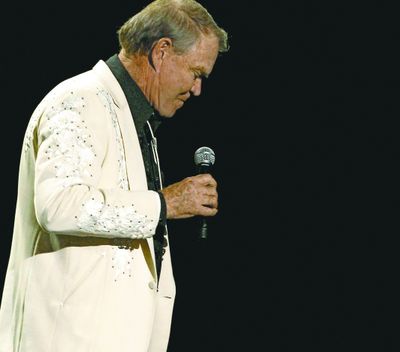Campbell keeps sense of self amid struggle
Film looks at country legend’s battle with Alzheimer’s

In 2011, country music legend Glen Campbell announced that he had Alzheimer’s disease, meaning that his upcoming album, “Ghost on the Canvas,” and tour would likely be his last. The announcement marked a tremendous loss for country music, as Campbell had always been recognized for his sharp sense of humor, his remarkable guitar dexterity and his angelic voice.
Director James Keach’s moving documentary “Glen Campbell: I’ll Be Me,” playing this weekend at the Bing Crosby Theater, is an intimate document of that tour. (The film garnered an Oscar nomination Thurdsay for best original song, “I’m Not Gonna Miss You,” written by Campbell and Julian Raymond.)
The Campbell family granted Keach unprecedented access – we see Campbell in good spirits and bad, we follow him to his doctors’ appointments, we glimpse some of his old home movies – and it results in an intimate, affecting, sometimes harrowing film.
Campbell is best known for his long career in country, and he was one of the pioneers of the hugely popular countrypolitan sound of the late ’60s and early ’70s. His biggest hits are among the best country songs ever recorded – “By the Time I Get to Phoenix,” “Gentle on My Mind,” “Galveston,” “Rhinestone Cowboy,” “Try a Little Kindness” and “Wichita Lineman.”
But Campbell’s influence extends far beyond the genre. He was a member of the legendary Wrecking Crew, a group of session musicians that appeared (usually uncredited) on dozens of seminal ’60s pop songs. He was an honorary Beach Boy, playing guitar on the band’s groundbreaking “Pet Sounds” album and filling in for the harried Brian Wilson on tour. He hosted a popular CBS variety show that featured Rob Reiner and Steve Martin among its writing staff.
“I’ll Be Me” doesn’t linger too long on Campbell’s history – most of it is addressed in an opening credits montage, and his turbulent personal life is basically ignored – focusing instead on his health issues and the final leg of his storied career. His touring band includes three of his eight children – sons Cal and Shannon and daughter Ashley – whose names he’s starting to forget; his wife, Kim, is a calming backstage presence at every concert.
Campbell played more than 100 shows on this tour (one of them was a sold-out concert at Northern Quest Resort & Casino in March 2012), and each new gig carries with it a sense of impending disaster. At one point, a teleprompter displaying Campbell’s lyrics shuts off unexpectedly, bringing the show to a crashing halt. He’ll start playing a song over again after he’s just finished playing it. He starts to get agitated because his guitar isn’t loud enough, and he’s convinced that a sound engineer is messing with his levels.
And yet the crowds are warm and receptive, and they respond appropriately whenever Campbell makes offhand, self-deprecating remarks about his failing memory. Even in his condition, Campbell effortlessly creates a personal rapport between audience and performer, a talent that seems to come as second nature.
The Campbell family has decided to make their struggles public in order to bring more attention to Alzheimer’s, and “I’ll Be Me” is an effective portrait of the complexities of the disease. It’s always a bit disarming to see major cultural figures in a less-than-flattering light – “Life Itself,” the documentary that detailed critic Roger Ebert’s medical issues, inspired a similar feeling – but Campbell remains an ebullient spirit throughout the movie. He still tells the same corny jokes, he still breaks out his Donald Duck impression, and his singing voice still carries a power, even if he’s singing while getting injections at the hospital.
And there is the occasional moment of clarity, when his eyes become a little clearer and he seems to be aware of what’s going on around him. As he’s preparing to collect a lifetime achievement award at the Grammys, Campbell is asked how he feels about receiving such an honor. “I ain’t done yet,” he responds. “Tell ’em that.”